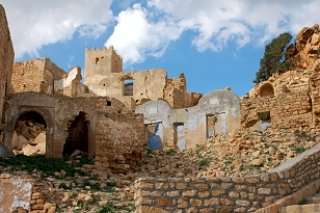Why Nazareth?

The Christmas story begins in the town of Nazareth nine months before the birth of Jesus. Now, if any narrative ever cried out for attention to detail it is this one, so it’s worth taking a good look at this little town and what it might tell us about the nature and character of God.
Nazareth is much more widely known today than it ever was in Jesus’ day. It is not among the sixty-three villages of Galilee mentioned in the Hebrew Talmud or the forty-five mentioned by first-century Jewish historian Josephus, who knew the area well. This was an insignificant little town. Its population is estimated to have been between one hundred and four hundred people, though its lack of mention in the Talmud and by Josephus might suggest that it was far smaller.
In telling a stranger about Nazareth, a native might well have mentioned the large nearby town of Sepphoris, which had a population of thirty thousand and was well known. Sepphoris was comparatively affluent, with culture, shopping, and undoubtedly all the other things expected of a prosperous town. Excavations have shown us luxury villas with extravagant tile mosaic floors.
Nazareth, on the other hand, had few of these things. It was likely a town of farmers, shepherds, and laborers who walked an hour each way to sell their goods and services in Sepphoris.
These were not affluent people by any means. In fact, evidence shows that, far from living in luxury villas, some of them may actually have built their homes within and around the area’s soft limestone caves—the least expensive form of housing in the first century and a sign of relative poverty.
Nazareth’s low social status is seen in John 1:45-46 when Philip, one of Jesus’ first disciples, told his friend Nathanael, “We have found him about whom Moses in the law and also the prophets wrote, Jesus son of Joseph from Nazareth.” Nathanael said to him, “Can anything good come out of Nazareth?”
A New Branch
The name of this tiny village of Nazareth tells us something about the people living there and offers a clue to the identity of the child Mary would bear.
Nazareth may come from the Hebrew netzer, which means “branch” or “shoot.” Sometimes when a tree is chopped down, a shoot will grow from the stump, allowing a new tree to spring up where the old one has died. That shoot is called, in Hebrew, a netzer. Why would the people who founded this village have called it “the branch”?
Much of the Old Testament was written predicting, or in response to, the destruction of Israel. The northern half of the country was destroyed by the Assyrian Empire in 722 B.C. The southern half of the country, known as Judah, was destroyed by the Babylonian Empire in 587 or 586 B.C. The prophets, in speaking about the destruction and re-emergence of Israel, used the metaphor of Israel being like a tree that had been cut down, but which would sprout up once again. Israel would be led by a messianic figure called “the branch,” so Isaiah 11:1-4, 6 says:
A shoot shall come up from the stump of Jesse
[Jesse, you remember, was King David’s father],
and a branch [netzer] shall grow out of his roots.
The Spirit of the LORD shall rest on him, . . .
His delight shall be in the fear of the LORD.
He shall not judge by what his eyes see,
or decide by what his ears hear;
but with righteousness he shall judge the poor,
and decide with equity for the meek of the earth; . . .
[And in those days] the wolf shall live with the lamb,
the leopard shall lie down with the kid,
the calf and the lion and the fatling together,
and a little child shall lead them.
The netzer was a promise of hope. The word as used in Isaiah 11 pointed to the promise that, though Israel had been cut down like a felled tree, she would rise up once again. Fifty years after the destruction of Judah by the Babylonians, the Jewish people would return to the city of Jerusalem. Judah would rise up like a shoot. And the people hoped for the coming of the “branch” that the prophets foretold would lead the people—a messiah. (Jeremiah and Zechariah also use this same imagery, though they use a different word for “branch” than netzer.)
When the village founders named their village Nazareth they may have chosen this name as a way of expressing hope that God would once again restore Israel—that though Israel had been cut down by the Assyrians, the Babylonians, the Greeks, and then the Romans, a branch would come up from the stump. They may have chosen this name because, in the words of the prophet Isaiah, it was a sign that there are no hopeless causes with God.
They may have chosen this name as a way of articulating their hope that one day the Messiah would come to Israel. It was as if they were saying, “We believe there is always hope. We believe God will deliver us. We believe the day will come when God will send a new king who will deliver us.” Little did they know that the branch foretold in Isaiah, Jeremiah, and Zechariah would be a child who would grow up in their own village!
Why Nazareth?
So, with all that we’ve learned about this town and these people, the question is: Why here? Why did God choose this town of all places to find a young woman to bear the Christ? Why would God choose this village, which was looked down upon by the people of Galilee (“Can anything good come out of Nazareth?”) and which was of such low standing that it was not included in the lists of towns of Galilee? What does it tell us about God that this story did not take place in Sepphoris among the wealthy living in their luxury villas, but instead in Nazareth among working-class people, some of whom lived in caves? What does it tell you about whom God can use to accomplish his purposes, or where God’s favor lies?
The setting of this story tells us that God looks for the meek and the humble to use for his greatest purposes. God chooses the least likely to accomplish his most important work. God chose a slave people to be his chosen people. God called the youngest of Jesse’s seven sheepherding sons, David, to become Israel’s greatest king. As Paul says to the Christians in Corinth,
“God chose what is foolish in the world to shame the wise; God chose what is weak in the world to shame the strong; God chose what is low and despised in the world, things that are not, to reduce to nothing things that are” (1 Corinthians 1:27-28). James says it this way: “God opposes the proud, but gives grace to the humble” (James 4:6).
Out of the humble, broken down stump comes the righteous branch that will save the world.
This article is excerpted from The Journey: Walking the Road to Bethlehem, a book and DVD study for small groups. See a sample video session below.
